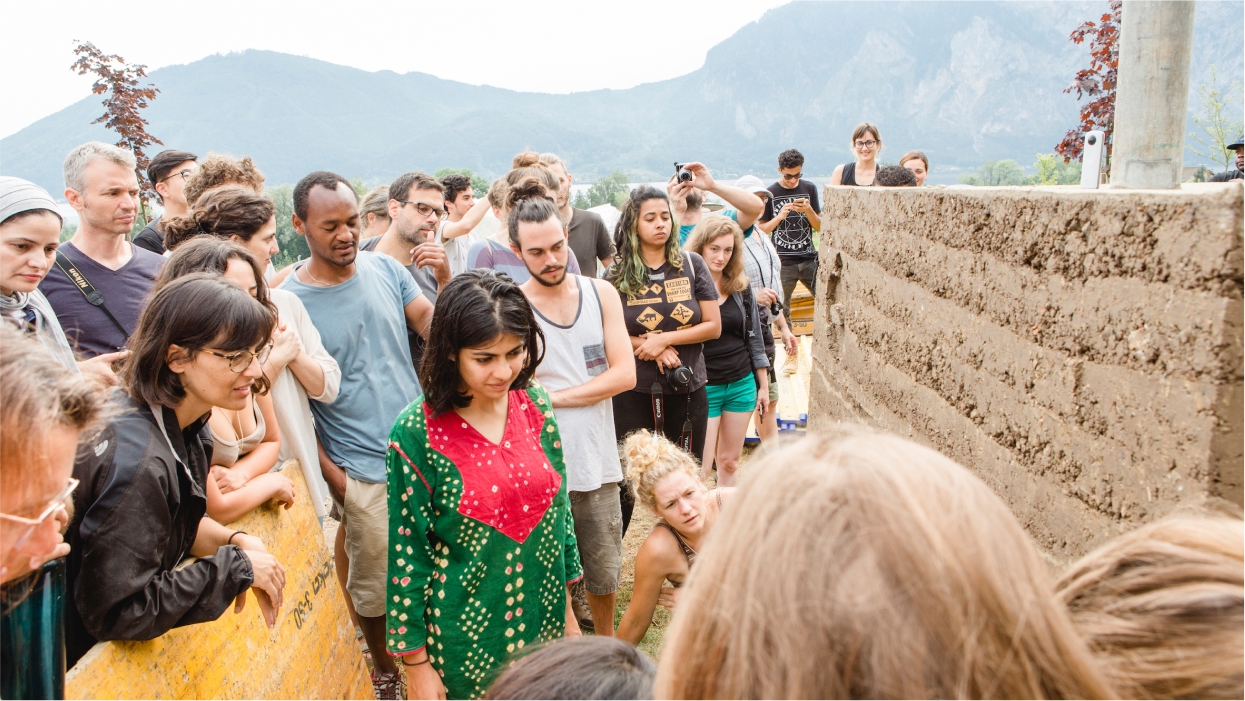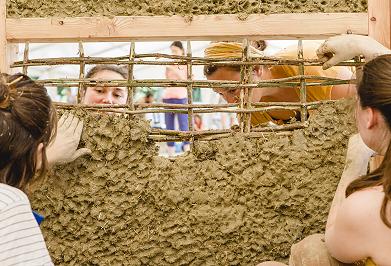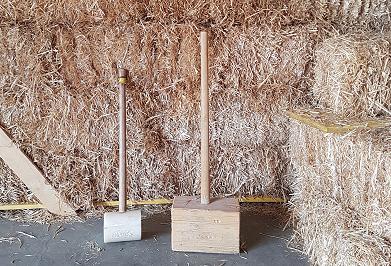
Photo: Stefanie Hueber
The Summer School provides practical knowledge on the use of sustainable building materials such as earth and plant fibres. Every two years, 100 participants and experts from around the world gather in Austria to work and learn together.

Photo: Stefanie Hueber
July 6 – 20, 2025
Wissenscampus Kuchl
Markt 136 / 5431 Kuchl
Salzburg / Austria
Last remaining places available!
NOTE: large scholarships - sold out!
Fill in the application form on our website and upload your portfolio
:: Fact Sheet Summer School
:: Time Schedule Summer School
:: FAQ Summer School
Please read our FAQ carefully. If you have any further questions, get in touch with us!
basehabitat.summerschool@kunstuni-linz.at
Participate and learn from the world’s leading experts in earthen and fibre construction!
Certification
Course certificate (4 ects) issued by University of ArtsLinz
Confirmation of participation issued by BASEhabitat
Application
Fill in the application form and upload your portfolio
Who can participate
We address architects, students, lecturers, craftspeople and engineers from all over the world, who are interested in sustainable architecture.
“Surely the summer school will have a great impact on my future life. New friends and experiences will lead to some future ideas for humanitarian architecture in developing countries and local work.”
participant, India
Find out more about the programm and read the full time schedule
Hands-on experiences with regenerative materials is at the focus of these two intensive weeks, which are complemented by theoretical inputs and discussions. There is a unique opportunity to network internationally with like-minded people and experts.
Our goal is to bring regenerative materials back into architecture - for a sustainable future of building.
Participants choose 2 of 4 workshops where they work in small groups of 20-25 people.
The workshops involve an intensive exploration of the possibilities of the material and testing it with your own hands (and feet). Inputs and experiments will range from simple construction methods to larger scale application in contemporary architecture.
There will be opportunities for exchange between the different workshops, for feedback and discussion.

Photo: Joana Varela
adobe + earth blocks
Franco Noriega, Margot Lacombe (amàco)
rammed earth
Dominik Abbrederis, Max Weidacher
earth + fibres
Becky Little, Francois Streiff
STRAW + REED
Angelo Ferrara + Christian Ditlefsen
The summer school starts with a whole day on material science. Experienced teams will introduce the materials earth and plant fibres and their special characteristics through inputs, experiments and practical exercises, including examples of traditional and contemporary architecture.
Pioneers who have developed new, unconventional materials for circular architecture will be invited to discuss their work. What does it take for these materials to find their way into architecture on a broad scale?
Networking is an important part of our summer school. Peer lectures give participants the chance to present their projects and discuss them with the group. Guests like Anna Heringer and Martin Rauch are going to give some inspiring lectures and share their experience and visions.

Photo: Stefanie Hueber
FH Salzburg - Campus Kuchl, amàco, rebearth, UNESCO Chair earthen architecture, University of Arts Linz
Schachinger Logistik, Mafell AG, Levita Lehm, LehmTonErde Baukunst, Sonnenklee, DaDo
We want to promote earth and natural fibres as excellent materials for sustainable architecture.
Earthen and plant architecture has not only a long tradition in human settlement, but it also offers many advantages for contemporary architecture. basehabitat wants to foster the consideration of socio-cultural, economical and ecological aspects in the architectural design and construction.
Exchange of knowledge and experience in the field of earth and plant fibre architecture.

Photo: Stefanie Hueber

Photo: FH Salzburg
The Summer School will take place at the Wissenscampus in Kuchl in Salzburg, Austria. Due to its long tradition of timber construction, Kuchl is also known locally as the "Timber Town". Timber is still a very important factor in the local economy, with a large number of craftsmen and wood processing companies in the area.
The Wissenscampus Kuchl, a conglomerate of different educational institutions for timber construction and marketing organisations of the Austrian timber industry. An inspiring network of know-how and innovation. We are preparing the summer school in close cooperation with the Holztechnikum and the Salzburg University of Applied Sciences, Campus Kuchl. The Department of Design and Green Engineering at the Campus Kuchl is celebrating its 30th anniversary this year.
Kuchl is located in the Salzach Valley, in the heart of the Alps. It is close to the city of Salzburg and is easily accessible by train. The region offers many sporting and leisure activities as well as cultural attractions.

Photo: Stefanie Hueber

Photo: Stefanie Hueber

Photo: Stefanie Hueber

Photo: Philipp Steiner

Photo: Stefanie Hueber

Photo: Stefanie Hueber

Photo: Christian Daschek

Photo: Flavia Matei

Photo: Philipp Steiner